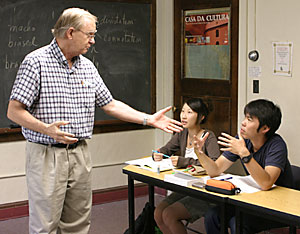 |
|
EVAN CARAVELLI/Arizona Daily Wildcat
|
Dean Jensen, a professor at the Center for English as a Second Language, encourages students to think of English words that are taken from other languages yesterday. CESL now offers courses on weekends, making it easier for students to take classes.
|
|
|
By Kylee Dawson
Arizona Daily Wildcat
Friday, September 3, 2004
Print this
Weekend courses offered at 'low prices' to improve language skills
To appeal to immigrants from Mexico, the Center for English as a Second Language has extended its evening program to also include weekend courses.
This program, open to all individuals who want to improve their English skills, is also available to immigrants with designated visas.
"As the only nationally accredited intensive English language program in the state of Arizona, we want to make CESL accessible to everyone," said Suzanne Panferov, director of CESL.
After Sept. 11, it became difficult for Mexican immigrants to request student visas to study in the United States, said Al Stover, assistant director of outreach and development at CESL.
"The difficulty was for people requesting student visas, not immigrants," he said. "It is still difficult because the U.S. requires upgraded documentation as well as additional fees to apply for visas. The process can take time and be relatively expensive."
If an immigrant already has a visa, a relative can receive a different type of visa, known as an F3 visa, which allows them entrance into the United States to study at the UA.
F3 holders from Mexico can attend colleges and universities in the United States, but only those within 25 miles of the U.S. border or, if entering through Arizona, 75 miles.
"They must get an F3 visa, which allows part-time study toward an educational goal. One of the reasons we're offering these new courses is because of the F3 availability," Stover said.
"There are many people living in Northern Mexico waho would like to study English or business English in the U.S. as commuters. Previously, they were unable to," he said.
Evening courses are available to students who want to improve their English skills and do not want to pay $4,000 for the 22-week semester.
The CESL programs are unique to the UA because anyone from anywhere can take the courses, but individuals affiliated with the UA get a 5 percent discount, said Stover.
"Our current population for these courses would include people at the university, post docs, graduate students, spouses of university students; anybody who's in the Tucson community who wants to practice or improve their language," he said.
"Our target market is people who work in the community, students at the UA, UA dependents and others in the community who cannot study full time for some reason."
Like the evening programs, the new part-time programs will be in 12-week increments and cost $6 per hour.
"We are simply expanding our offerings. We've been offering quality evening language instruction at a very low price for over 15 years," Stover said.
Parvaneh Farzad, who has taught for and been a coordinator of CESL evening programs for three years, said students in her CESL programs really appreciate the camaraderie in the courses.
"The group is very interesting and the people get along well with each other," she said. "There is no class division. They come from Europe, they come from all South American countries, Russia, from China, Korea, Japan, Greece, Iran for the part-time program."
Japan native Mikiko Higashi has been in the United States for 10 months and took professor Cat Clinton's Formal Presentation in English course last spring and a general evening CESL course in the summer.
"These evening classes seem so convenient for me because I'm busy in the daytime," Higashi said.
"I think I've learned two important things from my instructors. Learning another language is the same as learning another culture. A language is a tool for communicating with each other, not for arguments," Higashi said.
Taiwan native Cheng-Mau Wu has been in the United States for six months and is attending the UA as an exchange visitor in the department of hydrology and water resources.
Wu also took Clinton's presentation course in the summer and said he learned a lot about language skills, but especially appreciates the opportunity to meet and share experiences with people from other countries.
In addition to the advanced English courses, business courses will also be available for the first time as a component of the part-time program.
There will be an open house for the new part-time programs Wednesday at the CESL building. Courses begin Sept. 13.
